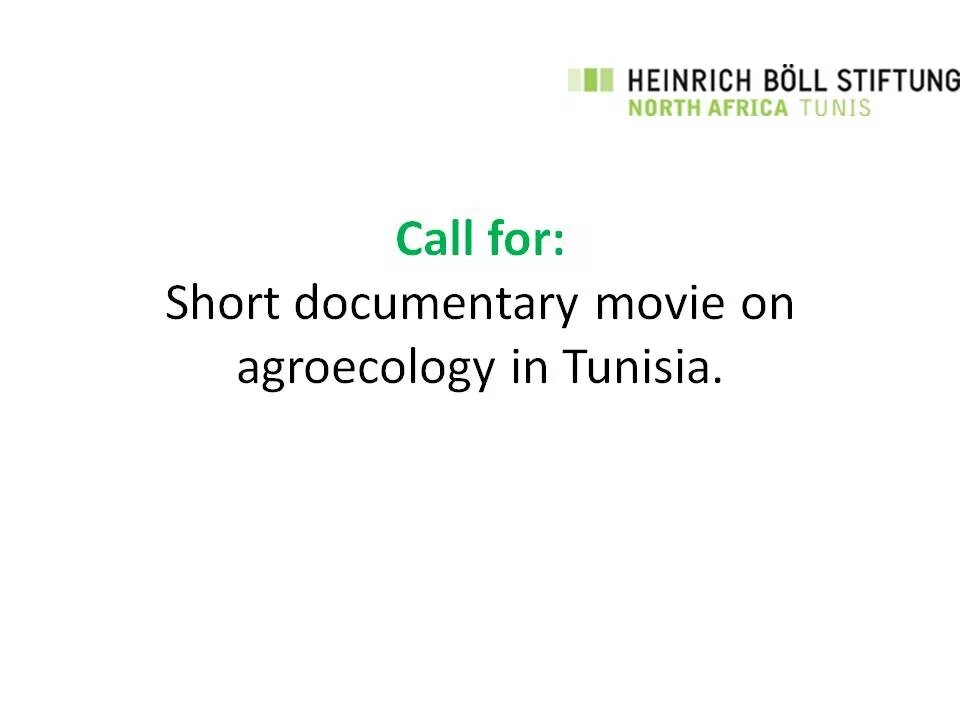
Summary
Heinrich Boll Foundation (HBF) seeks
a) to document the impact of climate change on the livelihoods of rural women farmers,
b) to understand the ways their gender intersects with and is impacted by other social factors such as gender roles, expectations and other social norms and practices held in their localities (intersectional factors) that affect especially women’s social-economic empowerment in Senegal, Morocco, Nigeria and Tunisia, and
c) to collect success stories on novel and transformative agro-ecological responses led by women in the four contexts.
HBF is producing the documentaries as part of its “Transform Africa” projects. The documentaries will be accompanied by a short paper or booklet on the same subject. The documentaries will form part of advocacy materials that will be used on both new and traditional media to influence decision-makers within and outside the continent in order to provide support.
The Documentaries:
The four documentaries will be filmed in Senegal, Morocco, Nigeria and Tunisia. In each country, a local film maker will be selected to capture stories of women small holder farmers practicing agro-ecology. The documentaries will also seek to highlight clearly the transformational message: from agro-business under a patriarchal system which blocks changes of models /regimes in agriculture, discouraging women to access land and assets (including financial and information assets) towards a food sovereignty and agroecology principles for a new agro-food system management. The documentaries will also focus on intersectional impacts and threats of climate change in concomitance with other multiple stressors of women in a patriarchal system.
OBJECTIVES
The main goal of the documentary on Tunisia is to produce a film on the impacts of climate change on women small holder farmers and their responses. Specific objectives of the documentary are:
1. Create a portrait of women farmers practicing agro-ecology and dealing with the patriarchal system, and working on good practice of adaption to face the impact of climate change.
2. Document the impacts of multiple gendered drivers of change and barriers that further compound their experience with climate change
3. Identify and document success stories of best agro-ecological practices, which are climate resilient and improving livelihood of women farmers in Tunisia
KEY OUTCOMES:
-
A 10 to 15 minutes’ documentary providing insight into the impacts of climate change on women small holder farmers in Tunisia and other gender barriers that they face in their specific context.
-
The documentary will include clips of success stories of best agro-ecological practices adopted by the women and document coping mechanisms against patriarchic social structures.
FORMAT
The film will be shot in HD format (1080P) and delivered in mp4 HD format (1080p). For uniformity in color and quality. The film maker will provide her/his own final edit without color grading and documentary should be shot with DSLR cameras.
PROFILE OF THE CONSULTANT FILM MAKER:
The consultant will be hired according to the evaluation of the following qualifications, expertise and skills required for the assignment:
TIMELINE
After receiving the final comments and suggestions from the project staff, the consultant should re-submit a final version of the film in a maximum time of 15 days from the finalization of the contract. After the final submission, the HBF will proceed to the final payment.
The documentary shall be shot, produced and finalized between July and October 2018.
The applications should be submitted by email to Email: soufyane.fares@ma.boell.org
Complete application documents should be submitted by 30 June 2018.
You can find more information in the file below: